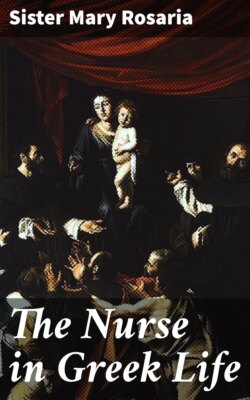Читать книгу The Nurse in Greek Life - Sister Mary Rosaria - Страница 4
На сайте Литреса книга снята с продажи.
CHAPTER I
TERMS USED FOR NURSE
ОглавлениеTable of Contents
Of the various terms employed in the literature to designate the nurse we shall speak only of four: τροφός, τιθήνη, μαῖα, and τίτθη. The first three are found in Homer[1] and the Hymns[2] with no apparent difference of meaning. τίτθη is of later origin and is used of a wet-nurse by Plato,[3] Demosthenes,[4] Aristotle,[5] Antiphanes,[6] Plutarch,[7] Soranus.[8] The ancient lexicographers generally bear out this meaning of the word. While Herodianus (I, 456, l. 2, Lentz), Hesychius and Photius give τροφός as a synonym for τίτθη, Suidas defines it more at length: τίτθαι, οὕτω καλοῦνται αἱ τοῖς τιτθίοις καὶ τῷ γάλακτι τρέφουσαι τὰ παιδία. Eustathius[9] calls wet-nurses τίτθαι, and those who have the care of children after weaning τιθηνοί and τροφοί: τίτθαι... αἱ τοὺς τιτθοὺς παρέχουσαι... τιθηνοὶ δέ, ἔτι δὲ καὶ τροφοί... αἱ τὸν ἄλλον φασί, πόνον μετὰ τὸν ἀπογαλακτισμὸν ἀναεχόμεναι. Pollux defines τίτθαι as αἱ θηλάζουσαι (II, 163) and again (III, 50) he says: τὴν δὲ θηλάζουσαν Εὔπολις τίτθην θηλάστριαν ὠνόμασε. Between τιθήνη and τίτθη he makes this distinction: ἡ δὲ τροφὸς τῆς κόρης, τιθήνη· καὶ ἡ γάλα παρέχουσα τίτθη (III, 41). However, a writer of the second century A. D. plainly referring to a wet-nurse, uses τίθηνη,
κοῦρος ὑπ’ ἐκ μαζοῖο τιθήνης
χείλεσιν αὖ ἐρύει λαρὸν γλάγος.[10]
The Etymologicum Magnum refers τιθήνη to τιτθόν: τιθήνας, τροφοὺς παρὰ τὸ τιτθόν. According to Brugmann[11] τίτθη, τιθήνη, τίτθος are formed by reduplication beside θήλη, “mother’s breast.”
As to the word τροφός, Herodianus (I, 225, l. 11, Lentz) refers it to τρέφω. Hesychius[12] contrasts it with θρέμμα, “nursling.” Pollux (l.c.) seems to distinguish τροφός and μαῖα and to take the latter as meaning more strictly, “Ea quae lactat,” as Stephanus remarks in his Thesaurus.
Various meanings were attached to the word μαῖα. Besides its use as “mid-wife,” it was employed as a form of address in speaking to nurses:
εἰ δ’ ἄγε δή μοι, μαῖα φίλη.[13]
μαῖα, θεῶν μὲν δῶρα καὶ ἀχνύμενοι περ ἀνάγκῃ.[14]
μαῖα, πάλιν μου κρύψον κεφαλάν.[15]
The signification was even extended to embrace the true mother, as attested by Euripides, Alcestis 393, where the child says of its mother: μαῖα δὴ κάτω βέβακεν.
To distinguish accurately and sharply between the different words for nurse is not our present purpose. Doubtless the differences between them were not broad and clear even to the Greeks themselves. τροφός seems to be employed as the generic term, while τίτθη is generally used for “wet-nurse” and τροφός and τιθήνη for “nursery-maid.”
